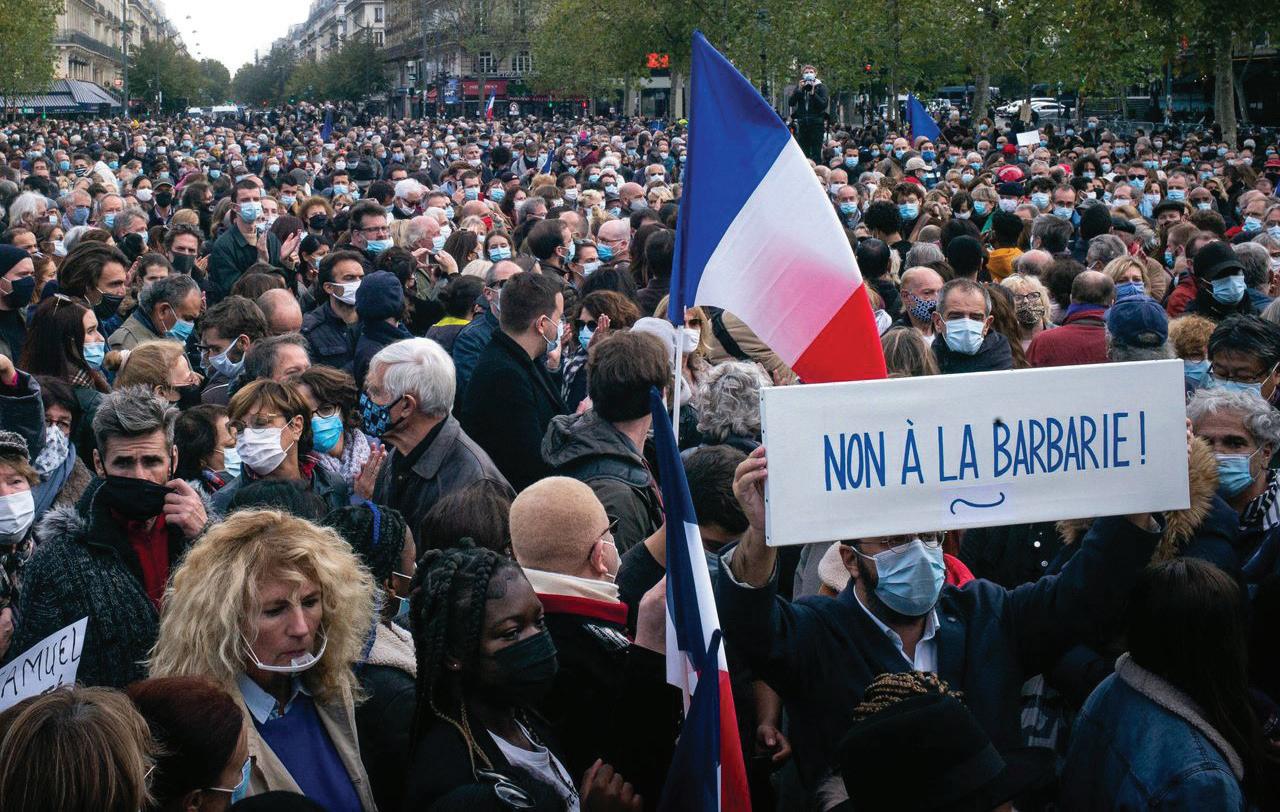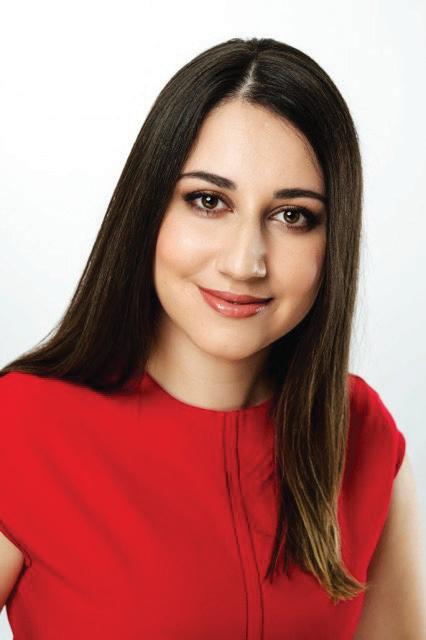
7 minute read
Editorial
US and India: A tale of two democracies
US President Donald Trump and Indian Prime Minister Narendra Modi
Advertisement
India is the largest democracy politics. Political pundits and and the United States the scholars in India were quick to oldest and both have witnessed draw parallels with US politics tectonic shifts in recent years predicting a liberal-secular in their political landscape. comeback against the Modi The rise of Prime Minister government. In this backdrop, Narendra Modi in India in 2014 elections were held in the state and Donald Trump in the US in of Bihar, along with the by2017 was seen as the emergence elections in Madhya Pradesh, of the far-right politics, Telangana, Manipur, Uttar marginalising liberal/moderate Pradesh, Karnataka, Gujarat and parties at the other end of the Telangana among others. Unlike political spectrum. in the US, the BJP secured a If the US saw the rise of white resounding victory. supremacists that fuelled racial The results have reinforced divisions in the US, the rise the broad trend since Modi’s of the Bhartiya Janta Party in rise in 2014 wherein the underIndia emboldened many right- privileged and women, largely wing vigilante groups across in the rural and semi-urban India. As the social fabric in areas have benefitted from the the US lay tattered following government’s schemes such as the death of George Floyd Ujjwala scheme (providing LPG triggering Black Lives Matter connections to Below Poverty movement the Republicans were Line families at subsidized pushed on the back foot by the rates), Swacch Bharata Democratic Party. In India, the Mission (Clean India campaign political milieu has remained constructing over 80 million divided as the Narendra Modi toilets), PM’s Awaas scheme government passed a series (affordable housing for urban of legislations such as the and rural poor), Jan Dhan Yojna Citizenship Amendment Act (opening bank accounts with Rs 2019 (providing sanctuary 0 for direct transfer of financial to minorities from Pakistan, sustenance), Beti Bachao Beti Afghanistan and Bangladesh), Padhao (financially self-reliant Triple Talaq, Farmers’ education schemes for girls), Produce Trade and Commerce PM Mudra scheme (loan to (Promotion and Facilitation) small businesses up to 1 million Act 2020 and the Jammu and rupees), Atal Pension scheme Kashmir Reorganization Act (monthly pension for people in 2019 (abrogating Article 35A and the unorganised sector aged amending Article 370 to alter between 18-40), PM Jyoti Bima J&K’s special status). The Modi scheme (life insurance of Rs, government also benefitted 200,000 for people between from the favourable Supreme 18-50), Ujala scheme (low priced Court ruling paving the way LED bulbs) and Pradhan Mantri for the construction of Ram Garib Kalyan Anna Yojana (free temple in Ayodhya, and adopted ration up to 6kgs per person) at a tough counter-terrorism the heels of Covid-19 outbreak, policy striking on the terrorist reaching over 800 million. hideouts in the Pakistan India’s democracy has presented Occupied Kashmir and standing an anti-thesis of the trends up to China’s aggression in in the US politics, perhaps Doklam and Ladakh. These because the Modi government measures have profoundly has delivered a large number of expanded BJP’s voter’s base schemes aimed at the poor and wooing women, restive youth women, and resolved complex and the poor. and contentious disputes Unlike Trump, who faces defeat, festering for decades. It would in 2019 Modi could have been be fair to argue that the Indian voted out too, but instead voters have risen above their retained power with 21 more ideological biases and voted for seats in the parliament. The good governance and strong victory of the Democratic Party leadership, which should be under Joe Biden and Kamala the hallmark of any thriving Harris—notwithstanding Donald democracy and the benchmark Trump’s alleging electoral for any effective government, irregularity—has been read as irrespective of the ideology it the beginning of the decline of represents. the far-right in international
France at Crossroads: Need for Acting Decisively but Sensibly
By Audrey Courty
In the wake of recent terror attacks, the French government said it would crack down on “Islamist separatism” but contradictory responses from officials are playing right into the hands of extremists. Instead of working to unite the country, French authorities are using divisive rhetoric and implementing policies that are further alienating France’s Muslim population. Shortly after the beheading of schoolteacher Samuel Paty, French Interior Minister Gerald Darmanin declared “a war against the enemies within.” He then launched a series of raids against Muslim associations and individuals, who, in his words, “were not necessarily linked with the investigation but to whom we are clearly willing to send a message.” Darmanin also called for the dissolution of anti-Islamophobia organisations, namely the Collective Against Islamophobia (CCIF), which he labeled “enemies of the Republic.” Going even further, the minister said it has always “shocked” him to see ethnic food sections in supermarkets because he believes they contribute to separatism in France. Linking the despicable act of one man to peaceful Muslim groups and institutions, while creating an atmosphere of suspicion, is dangerous. To understand how this enflames extremism, we must first realise that Islamist terrorists strike precisely to sow division and fear. There are many al-Qaeda and ISIS manuals that make their aim of driving a wedge between Muslims and non-Muslims explicit. As ISIS outlined in its online magazine as early as 2015, “Muslims in the West will soon find themselves between one of two choices.” The group explained that the prescient threat of terror attacks will lead to Muslims being treated with increased suspicion and distrust, forcing them to “either apostatise [convert]… or [migrate] to the Islamic State and thereby escape persecution from the crusader governments and citizens.” This divide-and-conquer strategy is crucial to terrorist groups replenishing their ranks and shoring up support from sympathisers. They target Muslims who feel marginalised from the rest of society and then lure them with promises of social status and a sense of belonging. That’s precisely why it’s so important for French leaders to work on social cohesion and lead with good examples. Yet French President Emmanuel Macron’s narrow focus on “reforming Islam” is stigmatising Muslims and downplaying France’s responsibility. Experts broadly agree that structural inequalities and socio-economic deprivation creates a propensity for Muslim radicalisation. They point to the ‘ghettoisation’ of Muslims in French banlieues and the higher rate of unemployment among Muslim youths. True, in an earlier speech in October, Macron conceded the country was not blameless in creating the problem it seeks to combat: “We have constructed our own separatism in our neighborhoods, creating ghettos, at the outset with the best intentions in the world – but we let it happen. We concentrated misery and difficulties, and we know it.” But any goodwill he might have earned for this admission was quickly erased when Macron patronizingly said Muslims needed to develop an “Islam of enlightenment.” The issue to be targeted is not religion. Religion is used by extremists to frame their actions and to capture the attention of Muslims. But the underlying problems are the social and individual risk factors that make a relatively small group of individuals susceptible to joining terrorist organisations or acting on their behalf. While Macron previously recognised France must do more to offer economic and social mobility to immigrant communities, his new antiradicalism plan following the killings in Nice does not. Instead, Macron is largely concentrating on the alleged shortcomings of Muslim schools and mosques, sports clubs, and fraternal circles. He said the government plans to cut off foreign funding to Islamic schools, train and license imams and Arabic teachers at French universities, ban halal meals from school cafeterias, and limit homeschooling. This sounds like more scapegoating from a government that has failed to push the country in a more inclusive direction, and that is trying to appeal to far-right voters. As the recent stabbings of two Muslim women under the Eiffel Tower suggest, these new measures will do little to fix France’s social ills and will likely exacerbate the threat of extremism of all types.
Audrey Courty
Indeed, at a time of deep polarization, there is now momentum to discredit academics who question the role of the state in perpetuating socioeconomic inequalities. French Education Minister JeanMichel Blanquer has called out what he describes as “intellectual complicities with terrorism.” He said so-called “Islamo-leftism… wreaks havoc in the university,” and blamed “indigenist, racialist, and decolonial ideologies” imported from North America of “conditioning” the man who killed Paty. Alarmingly, over 100 French academics stated their agreement with Blanquer in a manifesto published in the newspaper Le Monde this month. Voluntarily conflating Islam with Islamism, and branding academics who point out state discrimination against French Muslims as terrorist allies, stifles constructive debate and prevents us from addressing the root causes of radicalisation. The goal of terrorists is to divide our society, and French officials are creating the perfect atmosphere for them to succeed. Combating terrorism requires a united front; it requires cooperation between French Muslims and non-Muslims to integrate. We must reduce social tensions, not increase them. Only in doing so will we deprive extremists of the oxygen they need to survive. Audrey Courty is a PhD candidate and researcher at Griffith University, Brisbane, Australia, specializing in political extremism and digital media.












